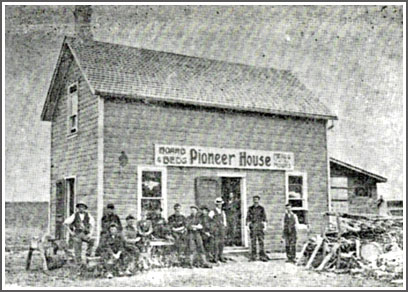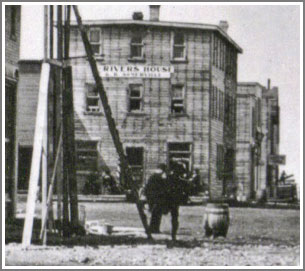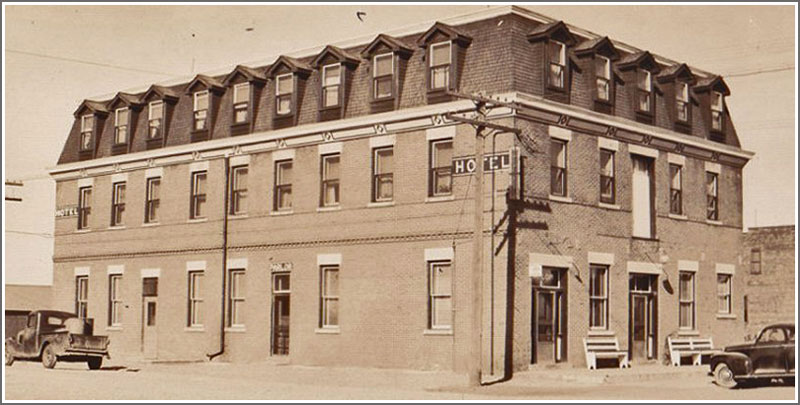
The Ups
and Downs of the Hotel Business

In 1908, before the railway arrived, the Pioneer House was open for
business. The prominent sign on the modest gable-fronted frame building
promised Board & Bed …Meals and Rooms.
The proprietor "Admiral" E. Harkness encouraged newcomers to drop
anchor for a “good square meal.”
There were a lot of new people in town and they needed a place to stay.
Hotels have almost vanished from smaller rural towns. We have cars, the
roads are good, there is not much need for an overnight stay. But in
the early days even smaller towns had a hotel. Booming towns like
Rivers had a few.
Before the end of 1908 the Pioneer House had competition. In fact, the
Rivers House, owned by G. B. Somerville had already begun a
sixteen-bedroom extension to his existing establishment.

The Rivers
House –1908
By 1909 Somerville's petition for a liquor license had provoked
controversy in town. It was approved, then revoked after a public
outcry. It was again approved upon appeal in 1910. By then the
business was re-named the Cecil House.
Battles over temperance; the battles of the “drys” and the wets”, were
a recurring feature in Rivers and elsewhere in rural Manitoba.
Walter Dynes bought the Cecil in 1912 and then purchased some lots
across from the depot with plans for a new larger brick building.
The battle over liquor permits continued until the Province enacted
prohibition in 1916. With the initial building boom over, and with the
War having taken away some many young men, the end of the liquor trade
spelled doom for hotels. Dynes had to abandon his newly built hotel
before it was even opened. Ownership of the property recerted to the
town.
In 1921 T. E. Shore of Winnipeg purchased the vacant “monument to
prohibition”.
It was to be called the Shore House, and the grand ball planned to
celebrate its opening was almost cancelled, when drayman James Taylor’s
team bolted during furniture unloading operations. After this somewhat
shakey start the business proceeded to thrive. In 1923 you could
get board and room there for $35 a month.
Re-named the Alexandra it invited farmers to make use of the wheat
market and stock- yard quotations they made available; they opened a
tea-room and the Good Eats Cafe operated for a short time until the
owners received a $200 penalty for breach of the temperance act - and
then lost their license.
In 1928 prohibition ended and the Alexandra hotel beverage room doors
swung open. The building was “modernized” in 1940 and an annex
added in 1949 and more renovations completed in 1959.

The
Alexandra was constructed in 1913. Its location, right across from the
Station, and its distinctive style, made it a landmark.
|
|